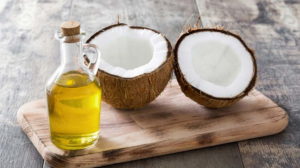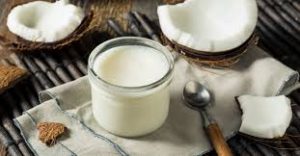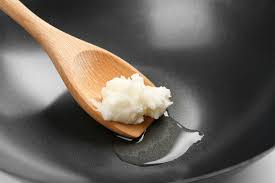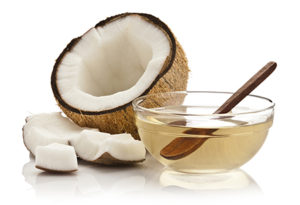Ilana Katz MS, RD, CSSD
Based on new interest in healthy fats, I have been asked my opinion on coconut oils more than anything else in the recent past. Most of the confusion arises based on its high level of saturation as a fat. When I was a dietetic student in the late 1990’s, the one of the facts that stayed with me is that coconut oil is one the most naturally saturated in fat sources that exists (as high as 90% actually). Therefore, how is it possibly a good fat? With more popularity on higher fat diets, research shows evidence why it is now considered a readily available source of GOOD fat. So investigating how a saturated fat goes from zero to hero, here are some conclusions:
Coconut oil is liquid at 78˚ F and human core body temperature is 98˚ F. Therefore coconut oil cannot be solid in our body. Furthermore, liquid oils are digested fairly quickly and easily. Once fat, such as coconut oil is absorbed into the bloodstream, it is broken down and converted into energy.
More technically, why coconut oil is misunderstood, is its distinguishing feature of a shorter fatty acid chain compared to other forms of saturated fats and triglycerides. Coconut oil is what we call a medium chain triglyceride (MCT). This means 6 to 12 carbon lengths long whereas most saturated fats have long fatty acid chains of greater than 12 carbon bonds. The smaller chain length makes coconut oil easier for the body to absorb, digest and process as its breakdown requires less energy and less enzymatic action that is needed for longer chain triglycerides.
Another distinguishing difference is that medium chain fatty acids once broken down enzymatically and are absorbed they are delivered straight o the liver whereas most other fats, are digested through a separate metabolic pathway, involving fat cells. From the liver, the MCT are used as a primary source of energy eliminating the storage of them as a fat in cells. The result is a metabolic rate rise as well as an overall improvement in cholesterol profiles. There is further proof in the pudding when Eastern cultures, those that use a significant amount of coconut oil in their diet, have very low rates of heart disease.
Health Qualities of Coconut Oil
Since coconut oil is a fat, a small amount is naturally more satisfying, and with its recently discovered health benefits to boot, this offers a step towards weight management goals. It has been researched positively in weight studies to show a reduction in belly fat.
Coconut oil is also been shown to have antioxidant qualities. In other words, a protective effect against cancer.
Some studies have even shown possibility that coconut oil has potential for reproductive benefits. Rats fed coconut oil increased levels of testosterone, particularly testicular antioxidants. Furthermore, components of coconut oil help block testosterone from metabolizing to dihydrotestosterone which in effect debilitate good testosterone.
Supplementation of coconut oil in mice showed an improvement in bone health. Bone micro-architecture, bone density and volume of bone cells were improved compared to the control group. This study thus enlights the possibility of the oil reducing the risk of osteoporosis.
One of the most interesting studies I found, had more to do with brain function and thus potential for slowing progression of Alzheimer’s. The metabolic pathway simply put, reduces insulin resistance. This is key because of a glucose transporter dysfunction typical to Alzheimer’s patients. Ketone bodies, the by-products of fatty acid metabolism, acts as the brain’s alternative fuel source. Coconut oil and MCT in general are rich in ketones because of there physiological make up. With a lower insulin response, the brain’s ability to use glucose (the brain’s preferred form of fuel) with ketone rich food, is enhanced.
MCT in general are known for enhanced immunity functionality, particularly towards oral and skin pathogens. Moreover, part of coconut oil’s structure, lauric acid, has powerful antimicrobial /antifungal abilities. Thus the oil has a positive impact on the fight against candida and albicans.
Other non-nutritional personal uses for coconut oil may include:
Skin moisturizer, hair smoother, cuticle care, bath additive, make-up remover, scalp health, sunburn soother, eczema ease-up and massage oil. I am sure there are many more and personal experience, stories and feedback are welcome.
In Summary, after distinguishing medium chain triglycerides from other saturated fat. coconut oil, with its excess of physiological benefits, turns out to be a good fat over all.




